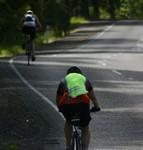
Not enough time to train? Train with quality, not quantity!
Even though winter is mostly behind us and the days are getting longer, warmer and sunnier, getting enough time to train is still a challenge. Work gets busier as the year ticks by, and there are all of those Christmas functions on the horizon! How are you going to get the time to train properly for the Wattyl Lake Taupo Cycle Challenge in November or for the many other great events in the New Year? If it all seems to daunting, then take heart. There is a way to get more out of less time.
The answer is surprisingly simple: make your training specific to the event you are focusing on. This means you focus on quality, not quantity and use the time you have efficiently. For most of the events you will do, you don’t need to clock over 400km a week. This is the domain of the elite cyclist or athlete preparing for the super-endurance events (like Ironman). For the average cyclist, it is both the intensity that you train at and making your training specific that will make the biggest difference. So if you want to be able to stay with a faster bunch around Taupo, or get up the hills quicker, or be able to out-sprint your mates along the Auckland waterfront, then you need to focus on specific quality training at the right intensity.
So, how do you achieve this? Interval training that is specific to the types of events or cycling you are training for. This means different types of training for different types of events. Here are some broad examples.
∑ For longer endurance races, like the 100km Rotorua to Taupo flyer, through to the Wattyl Lake Taupo Cycle Challenge, longer tempo sessions over varied terrain will give you the variability of a race, and improve your endurance. Tempo sessions are generally at around 80% of your maximum heart rate.
∑ For multi-day events like the Tour of Northland, you will need to do some back-to-back hard sessions, so 2, 3 or even 4 hard days in a row.
∑ To improve your hill climbing, you will train in a number of different ways, from long strength efforts (big gear at a low cadence), high cadence hills (to improve your aerobic efficiency), through to multiple short attacks. They will all resemble a race situation you are likely to find at some stage.
∑ To improve your sprinting, lots of strength work, accelerations and efforts at full gas, from 20 seconds through to 1 minute at a time, with short recovery periods in between.
∑ To become a better time trialist you will need to have a high lactate threshold, high sustainable power, and a great cadence, so long, higher intensity efforts will help you here.
Having said this, to become a better all-round cyclist, you will work on all of these specific components of cycling at some stage in a structured training programme, so even if your goal is to improve your Taupo time, you will also do some strength work, or accelerations at some stage in your build-up, just as the sprinter would be doing some longer tempo rides.
To train efficiently and effectively, you will need to measure your training using one of the many training tools available, such as heart rate monitors or power meters. These help you to train at the right intensity. Even better is to have a coach who can understand this information and personalise a programme for you and your goals. A coach will help you set some realistic objectives and will help you understand what you can achieve, and how long it might take you. It can take years to become a good cyclist, so having a longer-term perspective is essential to staying motivated and focused. A coach will also plan a programme for you that will avoid junk miles or downtime where you are just pedalling around, not doing anything that will make you fitter and faster, but neither will it help you recover.
We all lead busy lives and life is too short to waste it on training miles that are neither making you fitter or faster. Get specific and use every hour that you are on your bike to improve both your strengths and weaknesses. Not only will you improve more quickly, but also you will find your training sessions become more enjoyable as you become a better cyclist. Find your passion and then find the quickest way to get there!
Karyn Palmer is a cycling coach with Kinetic Edge (www.kecycling.com). She coaches all levels of cyclists and can be contacted on 09 368 7819 or karyn@kecycling.com
